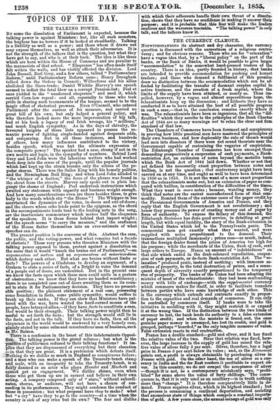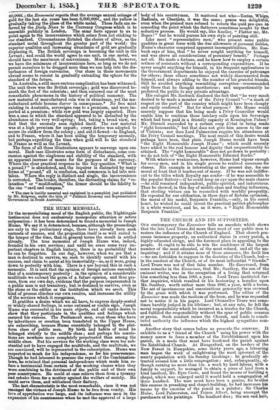THE CURRENCY CLAMOUR. NorwrnIsTANDING its abstract and dry character, the
currency question is discussed with the earnestness of a religions contro- versy; and for obvious reasons. Those who are for " relaxation" have a vague idea that, by a "liberal policy" on the part of the banks, or the Bank of Banks, it would be possible to give larger "accommodation" to the somewhat hard-pressed traders of the country. There is an idea, .partly founded in history, that banks are intended to provide accommodation for pushing and honest traders; and those who demand a fulfilment of this promise draw no distinction between. the accommodation which can be af- forded by facilitating the transfer of dormant surplus capital to active business, and the creation of a fresh capital, where the limits of the supply have been attained, or nearly so. Thus int- pelled, however, by a vague and almost superstitious hope, the relaxationists keep up the discussion ; and hitherto they have so conducted it as to have attained the best of all possible progress in such a ease,—that is, the conclusion remains exactly where it was. The relaxationists have been so ingenious, that all the "dif- ficulties" which they ascribe to the primeples of the Bank Charter Act of 1844 are so many warnings net to relax the clear and firm standard of that law.
The Chambers of Commerce have been foremost and conspicuous in rroving how little practical men have mastered the principles of their own business, and how deplorably the rule of thumb would lead men into disasters if there were not sound theorists near the Government capable of restraining the vagaries of empiricism. The Edinburgh Chamber of Commerce has been amongst those demanding prospectively a suspension of cash payments, a Bank- restriction Act, an extension of notes beyond the metallic basis which the Bank Act of 1844 laid down. Whether or not that act defined the necessarily exact proportion between notes and bullion, is not the question ; that controversy might have been carried on at any time, and ought as well to have been determined in 1850 as in 1855. It is not the want of a more exact proportion that the. relaxationists make out, but an extension of paper as com- pared with bullion, in consideration of the difficulties of the times.. What they want is more notes ; because, wanting money, they think that notes are the easiest manufactured form of that com- modity. Remind them of the extreme cases of the paper credit by the Provisional. Governments of America and France, and they reply that the English Government is not revolationeny ; and hence they presume its power of. creating money oat of paper by force of authority. To expose the fallacy of this demand,. the Edinburgh Scotsman has done good service; in detailing at great length, but with equal lucidity, the story of the Bank-extension in the United States which led to the Pennsylvania panic. The commercial men got exactly what they wanted, and were supplied with notes proportioned to the demand. Their transactions multiplied immensely ; prices rose—so.much, indeed, that the foreign dealer found the prices of America too high for his purpose; while the merchants of the Union, flush of cash, sent large orders to Europe. Hence an ammant of "indebtedness" on that side which ended in the drab-coloured repudiation, suspen- sion of cash payments, or de-facto Bank-restriction Act. The re- laxation " produced panic, instead of soothing ; with immense sa- crifices of property, to the total destruction of prices, and a conse- quent depth of adversity exactly proportioned to the temporary
rise of prosperity. The banks of the Union had been adopting the mistake of most of the relaxationists: they had been confounding money with bills of exchange—with the supplemental currency which commerce'males for itself, in order to facilitate transfers between parties who have some knowledge of each other. This is the currency which extends and contracts exactly in propor- tion to the capacities and real demands of commerce. It can only be controlled by commerce itself. If banks were to take the initiative in meddling with it, they might restrict it or expand it at the wrong time. If the distinction between the two kinds of currency be lost, the bank lends its authority to a false extension of paper credit; and when the mistake is found out, the once genuine paper money is swamped, has lost its credit, and gold is grasped, perhaps "hoarded," as the only tangible measure of value. False extension reacts in real contraction.
Pram* has a double standard—gold and silver, and it has fired the relative value of the two. Since that relation was fixed, how- ever, the large increase in the supply of gold has raised the rela- tive value of silver fully 5 per cent. Silver, therefore, has a legal price in France 5 per cent below its value ; and, as the Economist pi.nts out, a profit is always obtainable by purchasing silver in France with gold. On the other hand, the use of silver as a cur- rency in India and the far East renders it profitable to export sil- ver. In this country, we do not compel the acceptance of silver —though it is not, as a contemporary mistakenly says, "prohi- bited" for sums above the value of forty shillings. The conse- quence is, that it is only used as an auxiliary—is in truth nothing more than "change." It is therefore comparatively little in de- mand. France requires silver, which is its highest standard ; but the process is occasioning a continual deportation, and assisting that anomalous state of things which compels a constant importa- tion of gold. A few years since, the annual coinage of gold was only 40,0001. ' • the Economist reports that the average annual coinage of gold for the last six years has. been 6,000,000/., and the yellow is gradually-taking the place of the white metal. These facts are re• ferred by the Daily. News to the Currency Congress which is to assemble publicly in London. The same facts appear to us, to point again to the inconvenience which_ arises from. not sticking to one standard. Circumstances dictated the choice of silver, as the standard metal throughout the greater part of the work: the superior-qualities and increasing abundauce.of gold. are gradually displacing it. The British sovereign is. becoming the unit in the Levant ; and could. the world agree to, one unit, in one metal, we should have the maximum of. convenience. Meanwhile, however, we have the minimum of inconvenience here, so long as we do not permit ourselves to be dragged more than we can help into the dis- turbances of foreign currencies. Onr share in those movements abroad seems to consist in. gradually extending the sphere for the standard of the future..
In Australia, a.still more carious complication. has been witnessed. The unit there was the British sovereign ; gold was discovered be- neath. the feet of the colonists ; and. then. occurred one of the most remarkable phenomena in the history of political. economy. The raw material of manufactured coin was in abundance, yet the ma- nufactured article became dearer in consequence." No free mint existing in Australia,, sovereigns rose to a premium, and were im- ported at a premium; while raw gold, was largely exported. Here i
was a case in which the standard appeared to be. disturbed by the abundance at its very well-spring; but, taking a broad view, we find that the anomaly soon righted Reelf. The raw material was at a high premium for expert, every device was adopted to s,ecnre its outflow from- the. colony ;; and out it flowed—to Hngland, and to. France, where it has been aiding the temporary anomaly, but perhaps.expediting the time when. gold, will be the standard in France as well as the Levant, The force of all. these illustrations appears to converge upon one moral.. Each case. illustrates some form of disturbance, souse., con- cussion. against the singleness,and stability of the standard, with an apparent increase of means for the purposes of the currency.. Where the clearpractical responselo the li-cluestion, "What is a pound " is abandoned,,andthe inquirer is distracted. by many forms of "pound," all is confusion, and commerce, is labile mis- takes. Where the reply is diatinet and single, the inconvenience is corrected. The louder, therefore, thu distracting ciabas for " re- laxation" or "modification," the firmer 'should, be the fidelity. to the one " card,,and compass."
* The Malls lucidly' Initiated and explained in a-pamphlet just published by Mr. Ridgway,, under the. title "Rolitical Economy. and Representativeof 'Government. in South Amstralia,7



























 Previous page
Previous page